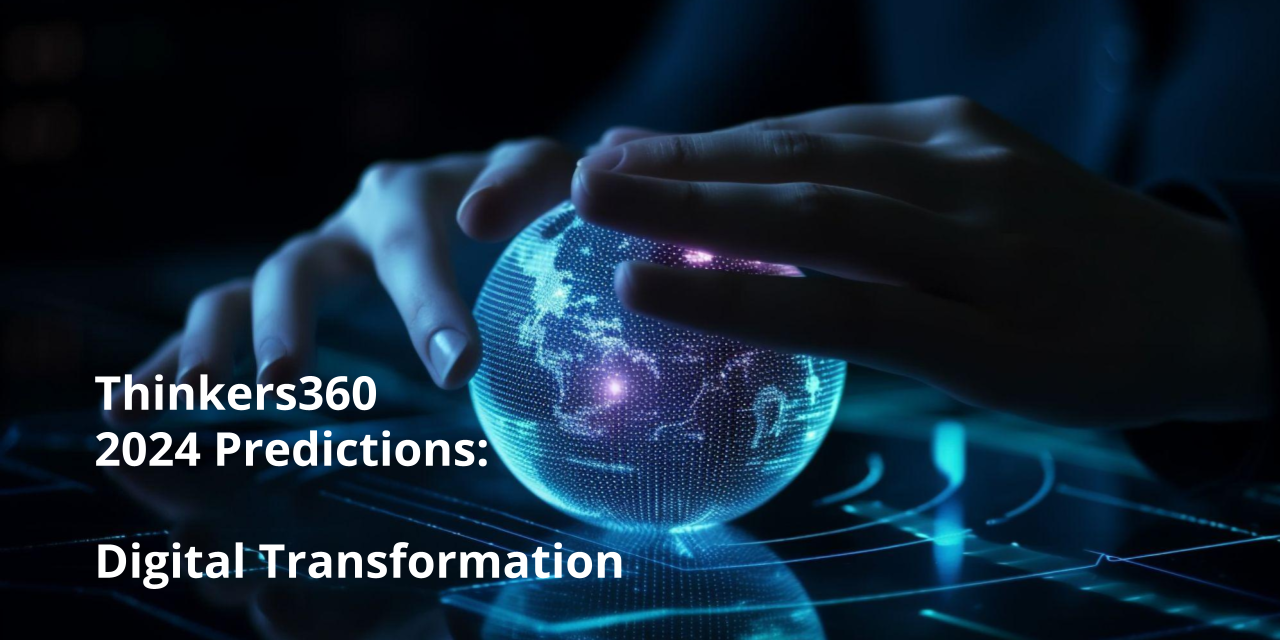Thinkers360 2024 Predictions for Digital Transformation are member-sourced from our opt-in B2B thought leader and influencer community with 100M+ followers on social media combined. The 2024 Predictions for Digital Transformation are part of a series to provide actionable insights for business and technology executives.
Thought Leaders & Influencers: To join the world’s largest opt-in B2B thought leader community and influencer marketplace, participate in our leaderboards, earn credentials, and curate, amplify and monetize your personal brand –Sign-up today for free!
Readers & Writers: To contribute your own content and to browse amazing content – including articles/blogs, books, podcasts and videos, from our opt-in B2B thought leader and influencer community – join Thinkers360 today!
Brands & Agencies: Sign up to find and work with advisors, analysts, authors, influencers and speakers in your niche and to activate and amplify your own executives, thought leaders, employee advocates and content on social media and among our opt-in community of analysts and influencers (100M+ followers on social media combined)!
We asked a selection of our Thinkers360 global thought leaders and influencers about their predictions for Digital Transformation in 2024. Here’s what they told us…
What are your predictions for Digital Transformation in 2024?
We are entering an era of design and even more, an age of co-design.
In today’s world, businesses have transcended the traditional confines of merely pursuing economic gains.
One imperative is not only to manage but design an ecosystem that delivers value not only through financial metrics but also through its impact on society. This ecosystem must be intentional in its architecture, ensuring that every stakeholder and process contributes positively to the broader social fabric.
In doing so, a business does not simply partake in society; it actively shapes a future where doing the right business and doing business right are not mutually exclusive, but rather, mutually reinforcing.
However, the challenge of ecosystem design does not reach its zenith within the contours of present-day business models and their societal contributions alone; it escalates profoundly with the advent of artificial intelligence.
Generative AI marks a paradigm shift akin to the invention of the automobile, heralding a period of seismic change across all sectors. As we stand at the precipice of this AI era, it is crucial not only to design but to co-design the forthcoming ecosystem that will underpin this transformative age. This co-design process must involve a consortium of stakeholders — regulators, technologists, consumers, and ethicists — to collectively navigate the profound metamorphoses that will reshape society.
The automotive industry’s evolution offers a blueprint for this journey. Just as the introduction of cars necessitated the creation of traffic laws, speed limits, and safety measures like seat belts, the rise of AI demands a similar construction of new guidelines and infrastructures. We must anticipate the redefinition of work, the ethical considerations of machine autonomy, the safeguarding of digital identities, and the list goes on.
The automobile revolution brought about auxiliary shifts — petroleum industries expanded, urban planning evolved to accommodate roads and highways, and automotive manufacturing became a cornerstone of economic growth. Similarly, the AI revolution will catalyze transformations across data security industries, education for digital literacy, and new governance structures for tech oversight.
In this nascent megachange, the parallels to the automobile’s impact on society are striking and illustrative. We are not merely adopting a new technology; we are stepping into an era where every element of our socio-economic existence will be re-examined and re-engineered. As we co-design this ecosystem, we stand not as passive witnesses but as active architects of an age that promises to redefine humanity’s trajectory.
– Hamilton Mann, Group Vice-Président, Digital Marketing and Digital Transformation at Thales, Host of The Hamilton Mann Conversation, a platform to share knowledge about Digital For Good.
As digital transformation in business continues, there will be a greater emphasis on the human side of transformation and technology. Companies will recognize that a positive and engaging work environment is crucial for productivity and innovation. Technology solutions and digital platforms will be used to enhance workplace satisfaction and collaboration. Leaders will need to adapt to a rapidly changing digital landscape, including embracing new technologies, fostering a culture of continuous learning, and leading by example in the digital realm. Leadership styles may shift towards more collaborative and agile approaches. Additionally, digital literacy will become a fundamental skill, just like reading and writing. Employees at all levels will be expected to have a basic understanding of emerging technologies and how they can be applied in their work. Organizational cultures will evolve to prioritize innovation and agility. This means encouraging experimentation, accepting failure as a learning process, and rapidly adapting to changes in the market and technology. Continuous upskilling and reskilling will become a norm. Organizations will invest in training programs to ensure their workforce is equipped with the latest digital skills and knowledge. As automation and AI take over routine tasks, there will be a shift in job roles. The focus will be on roles that require human creativity, empathy, and strategic thinking, which cannot be easily replicated by machines.
– Kamales Lardi, CEO at Lardi & Partner Consulting.
Digital transformation is already revolutionary, integrating advanced technologies into every facet of life and business. One prediction is the widespread adoption of Artificial Intelligence (AI) in daily operations, significantly enhancing efficiency and decision-making processes. For instance, AI already is used in healthcare for personalized treatment plans, using patient data to predict outcomes and recommend treatments. Another area is the Internet of Things (IoT), which will see an exponential increase in connected devices, leading to smarter cities and homes. This could manifest in intelligent traffic management systems that reduce congestion and improve safety. Additionally, the blockchain is gaining prominence, not just in finance but in securing digital identities and supply chains, ensuring transparency and trust in a digital-first world. For example, blockchain could be used to track the provenance of products, providing consumers with verifiable information about the origins and journey of their purchases.
– Nicolas Babin, President at Babin Business Consulting.
For 2024, I’m most excited to see how digital transformation accelerates the emergence of regenerative, composable models that make markets more modular, agile, and sustainable. Specifically, I foresee advances in AI accelerating collaboration, enabling the collective creation of multi-provider, multi-sector experiences. Decentralized technologies will accelerate the development of digital primitives that underpin composable ventures while the combination of digital twins, AI, and quantum computing will enable regenerative, composable models to bring us closer to understanding, modeling, and solving our grandest societal challenges.
– David Kish, Ecosystem Advisor at Tata Consultancy Services.
2024 will continue to be uncertain because of macroeconomic headwinds. The economy might swing in either direction. We might go for a recession or maybe for a recovery later in the year. Most organizations are likely to be conservative with their digital transformation investments. 2024 is also going to be a year to learn how AI will impact the way we conduct business. The fastest impact we are likely to see in content generation, thus driving faster adoption of digital technologies and channels.
– Sam Gupta, Principal Consultant at ElevatIQ Inc.
Expansion of AI Ethics – In 2024, I predict a greater emphasis on AI ethics. Organizations will likely adopt more robust ethical frameworks for AI, focusing on transparency, accountability, and bias mitigation. This will be in response to increased public scrutiny and the need for trust in AI systems.
Rise of AI Literacy – As AI becomes more entrenched in business and society, I foresee a push towards AI literacy, where understanding AI’s capabilities and limitations will become as fundamental as using a smartphone. This will extend beyond the tech sector, affecting every level of the workforce.
Regulatory Evolution – There will be a concerted effort to develop international standards and regulations for AI, which will be critical to manage the societal impacts of technology. I expect that my own engagements with policymakers will reflect this growing trend.
Hybrid Workforce Models – Hybrid human-AI collaboration will become the norm in workplaces, with ‘cobots’ becoming integral to knowledge work and decision-making processes. This aligns with my work on the human-AI collaboration in managerial professions.
Decentralized AI – There may be a shift towards decentralized AI models, moving away from big data centers to distributed computing, allowing for more private and secure AI processing at the edge. This decentralization will resonate with my research into the privacy aspects of technology in the workplace.
– Aleksandra Przegalinska, Vice Rector at Kozminski University.
The Great Reconciliation
With 2023 being the year that AI catapulted into the mainstream of business conversations, 2024 is going to be the year that organizations need to reconcile their long-term digital transformation plans with the need to embrace relevant artificial intelligence applications in key areas.
– Greg Kihlstrom, Principal at GK5A.
As a seasoned leader in digital innovation across banking, payments, retail, and various sectors, with over two decades of global experience steering digital functions and spearheading innovations, I foresee several pivotal trends shaping the landscape of digital transformation in 2024:
Hyper-Personalisation in Services: Leveraging AI and machine learning, organisations will push the envelope on personalisation, crafting user experiences that are not only tailored to individual preferences but are also predictive and adaptive in real time.
Decentralised Finance (DeFi) Growth: The financial sector will likely witness a surge in DeFi applications, providing more autonomous and open-source alternatives to every financial service we use today, from banking to insurance and beyond.
Omni-Connected Experience in Retail: The retail sector will continue to blur the lines between online and offline experiences, offering a seamless omnichannel customer journey through the use of IoT and advanced analytics.
Sustainable Digital Ecosystems: Amid growing environmental concerns, digital transformation will increasingly include a sustainability component, optimising operations to reduce carbon footprints and promoting green technology.
Advancements in Quantum Computing: With quantum computing reaching more practical levels of application, we may see significant breakthroughs that could revolutionise data processing and encryption.
Expansion of 5G and Edge Computing: These technologies will likely become the backbone of digital operations, enabling faster processing at the edge of the network and supporting the explosion of IoT devices.
Mainstreaming of Blockchain: Beyond cryptocurrencies, blockchain technology will become more mainstream, finding utility in securing supply chains, validating digital identities, and ensuring data integrity.
Robotic Process Automation (RPA): RPA will move towards more sophisticated cognitive processes, automating complex decision-making tasks and becoming integral in day-to-day business operations.
Increased Focus on Cybersecurity: As digital infrastructures become more intricate, cybersecurity will become even more paramount, with AI-driven security measures becoming standard to preempt threats.
Human-AI Collaboration: There will be a stronger focus on enhancing the collaborative interactions between humans and AI, ensuring that AI tools augment human roles, leading to new job categories and opportunities.
– Dr. Ritesh Jain, CEO/Founder at Infynit.
2024 will see a confluence of emerging technologies intensifying the leadership challenge of sensemaking digital disruption. In particular, the widespread adoption of generative AI will exacerbate existing digital transformation complexities. Clarity of vision, a clear roadmap, organisational buy-in, and a commitment to responsible and ethical use of technology are now more important than ever and must be a key focus for business leaders in 2024.
– Tony Moroney, Principal at The Digital Explorer.
Digital transformation has evolved from the simplistic notion of creating an electronic presence to rethinking an organization’s business processes and accomplishing this reinvention at scale. In 2024, digital transformation means rethinking processes from the perspective of our customers. Central to this shift is a deep, empathetic understanding of customer needs, interwoven with digital insights from their interactions with our brand. This approach integrates digital transformation seamlessly into the customer experience journey. Viewed this way, digital transformation is a natural extension of customer experience. In 2024, the challenge is linking human-centric approaches to the power of data. Ignoring this element will yield unsatisfactory results that do not reflect customer needs or foster consumer loyalty. Many companies may fall into the trap of investing heavily in AI tools, mistakenly equating them with modernization. While AI can enhance efficiency, its true potential is unlocked only when paired with relevant data and a profound customer understanding. Successful digital transformation in 2024 rests on a blend of data-driven strategies and a genuine, human-centric approach to customer engagement. Companies aiming for transformational success must refine their data analysis capabilities while deeply empathizing with their customers. This dual focus will be the cornerstone of thriving in the digital landscape of 2024.
– Michael Krigsman, Industry Analyst at CXOTalk.
Digital is the norm, making Digital Transformation predictions challenging. Most global revenues are from digital. Corporate valuations are driven by intangible assets (software, data, people). Digital has become the go-to for new business models, products, services, and markets. In 2024, we will see this deepen as technologies, especially AI and IoT, are embraced to drive additional business value, foster sustainability, and promote Diversity, Equity, and Inclusion (DEI). The world has recognized cyber as essential to mitigate risk and foster adoption as we drive digital value. In 2024, we will see more and more organizations embrace concepts like Security-by-Design-and-Default along with the safety and security of AI essential to fostering Digital Trust. Privacy will increasingly be regarded as critical to commerce.
– Alex Sharpe, Principal at Sharpe Management Consulting LLC.
###
Join us on Thinkers360 — The World’s Premier B2B Thought Leader & Influencer Marketplace!
Thinkers360 is the world’s first, largest and premier B2B thought leader and influencer marketplace — including academics, advisors, analysts, authors, consultants, executives, influencers and speakers — with over 100M followers on social media combined. We are differentiated by our unique patent-pending algorithms that measure thought leadership and authentic influence looking far beyond social media alone.
Individuals: Connect and work with global brands as an advisor, author, consultant, influencer, speaker and more. Showcase your thought leadership profile and portfolio, build your media kit, amplify your content, and participate in our global leaderboards and opportunity marketplace: Sign-Up (free) | Subscribe to our Newsletter
Enterprise (including brands & agencies): To find and work with advisors, analysts, authors, influencers and speakers in your niche and to activate and amplify your own executives, thought leaders and content among our opt-in B2B thought leader and influencer community (100M followers+ on social media combined): Request an Enterprise Consultation | Explainer Video | Subscribe to our Newsletter
Want to find and work with advisors, authors, consultants, influencers and speakers (including access to our unique thought leader profiles and portfolios, in-depth reports and analytics, warm personal introductions, and our zero-transaction fee speaker bureau)?
Contact us to discuss any of your freelancer and gig economy needs at info@thinkers360.com
For custom thought leader and influencer lists, advertising and sponsorship opportunities, please contact info@thinkers360.com.

















